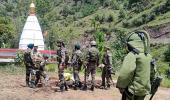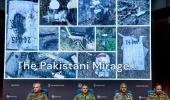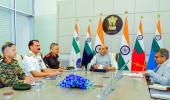'The lesson Beijing would have learned is that there is, cost-benefit wise, no better option than to keep the Pakistan military supplied with its most advanced armaments, certain that in hostilities with India these would be used for maximum effect.'

"If the Indian government won't use the incidence of Pakistani sponsored terrorism to territorially diminish PoK, there is no disincentive whatsoever to the ISI to divert from its strategy that has pushed India to the wall," asserts Dr Bharat Karnad, a well-known contrarian voice on national security.
Dr Karnad, emeritus professor in national security studies at the Centre for Policy Research, the New Delhi-based think-tank, is the author of India's Nuclear Policy and Nuclear Weapons and Indian Security: The Realist Foundations of Strategy.
The concluding segment of a two-part interview.
In a sense, does this conflict redefine war, when adversaries don't cross their territory, but hurl swarms of drones and missiles at each other?
Can such a stratagem be limited in its duration and geographical spread?
Yes, in fact, this is medium-term future war in embryo. Weapons with lethality and range will be more important than platforms, like combat aircraft.
This future will transition soon to Artificial Intelligence-driven autonomous weapons systems slaved to fused information dissemination systems aided by quantum computing with the ability to surveil and prioritise target sets, in effect, to war solely by machines.
Such wars were first imagined by H G Wells in his 1898 book War of the Worlds. Except, Wells' adversary were Martians invading earth!

Will such forceful military action get the terrorists and their sponsors in the ISI and Pakistan army to end their campaign of murder and mayhem?
Or is that highly unlikely given that using terror to hurt India is a long established Pakistan military doctrine and not one the ISI/Pakistani army will renege from no matter what India's actions?
The terrorists may lie low for a while before resuming their sinister campaigns.
Pakistan lost nothing in Sindoor for its army to change its mind about the utility of terrorism as an asymmetric weapon to keep the Indian government and military unsettled. Why would they give it up?
Prime Minister Modi declared on Monday that future terrorist attacks will be dealt with militarily, like the one we saw last week. This seems like a directive from the Mossad stylesheet.
Please don't compare Modi's list to Mossad's modus operandi, which is nothing as catholic! Israelis never leave anything they start half done.

Since the ISI and the Pakistan army won't call off their beasts, what options does India have to prevent horrific acts of terror like Pahalgam 22/4?
If the Indian government won't use the incidence of Pakistani sponsored terrorism to territorially diminish PoK, there is no disincentive whatsoever to the ISI to divert from its strategy that has pushed India to the wall.
What has been the fallout of Operation Sindoor in Pakistan in your opinion?
This entire episode, beginning with the Pahalgam attack, was seen by Pakistan-watchers as a gambit by Asim Munir to shore up his own and the army's battered-by-Imran Khan image.
That the Pakistanis would once again see Munir and the army as the only guardians of national interest, able to protect them, against India.
Has that illusion been shattered by India's deep strikes into Pakistani territory?
Why do you think the Pakistan military failed to thwart India's attacks?
Whatever the other fallout, the Pakistani military, surely, would worry about just how porus and ineffective its air defence systems proved in preventing Indian drone and missile salvo firings.
Otherwise, the Op Sindoor worked out according to their script!

What about the Chinese presence in this 72-hour war?
Beyond the anodyne statements asking India and Pakistan to observe restraint, was China a not visible participant in this conflict by transmitting satellite-conveyed observational intelligence to GHQ Rawalpindi and, of course, by pitting Pakistan's Chinese weapons against India's Western origin armaments.
China visibly gloated -- did anybody notice the self-satified smirk on the face of the Chinese government spokesman when he advised retraint?
Its client, the Pakistan air force, in particular, professionally combined its Swedish Saab Erieye AWACS to track Indian aircraft movements in Indian airspace, the small numbers of the Chinese J-10C fighters in its fleet flying in passive mode until firing the apparently deadly Chinese long range PL-15E air-to-air missile (A2A) for very good effect.

What does the almost direct Chinese involvement in the 72-hour war augur for future conflicts with India?
Could the Indian Army confront a two front situation in the future, and how could we overcome it?
The lesson Beijing would have learned is that there is, cost-benefit wise, no better option than to keep the Pakistan military supplied copiously with its most advanced armaments, certain that in hostilities with India these would be used for maximum effect.
And that this, in turn, would burnish the image and reputation of Chinese-built military hardware in the exponentially growing international arms bazaar and increase its arms exports, besides showing up India and its military as not even the equal of Pakistan.
Was the rapprochement of October 2024 with the Chinese a mistake? Why did we reach out to the Chinese after four years of asserting how bad the India-China relationship was?
Prime Minister Modi and External Affairs Minister Jaishankar should answer this.
Sure, in Trump's world it is good for India to have relations with China as policy leverage.
But considering that the status quo ante on the disputed border with China as of 2020 has not been restored and China has made no concessions elewhere, such as in trade and investments and, on the other hand, Trump has time and again succeeded in making Modi do whatever Washington wants, including buying, as is strongly rumoured, military hardware including the hopelessly bad F-35 'so-called 5th gen' warplane, the fact is whatever the policy the Indian government is pursuing is not working.
How much more evidence do they need?

Will Pakistan use this pause in battle to rebuild its arsenal with Chinese help and perhaps some part of the billion dollar loan that the IMF had just given Islamabad?
Look, it is clear the $1.3 billion IMF loan was the means to influence Islamabad into accepting the termination of Sindoor.
There's another $7.4 billion tranche of credit awaiting clearance.
So, GHQ, Rawalpindi, will do nothing until that second lot of money is in hand before letting the ISI allow the LeT/JeM cadres now grouped under The Resistance Front to once again launch terrorist acts in J&K, and possibly elsewhere in India.
If Modi is to be taken at his word, this will mean many more Sindoors, hopefully, with different results!
Feature Presentation: Aslam Hunani/Rediff.com










